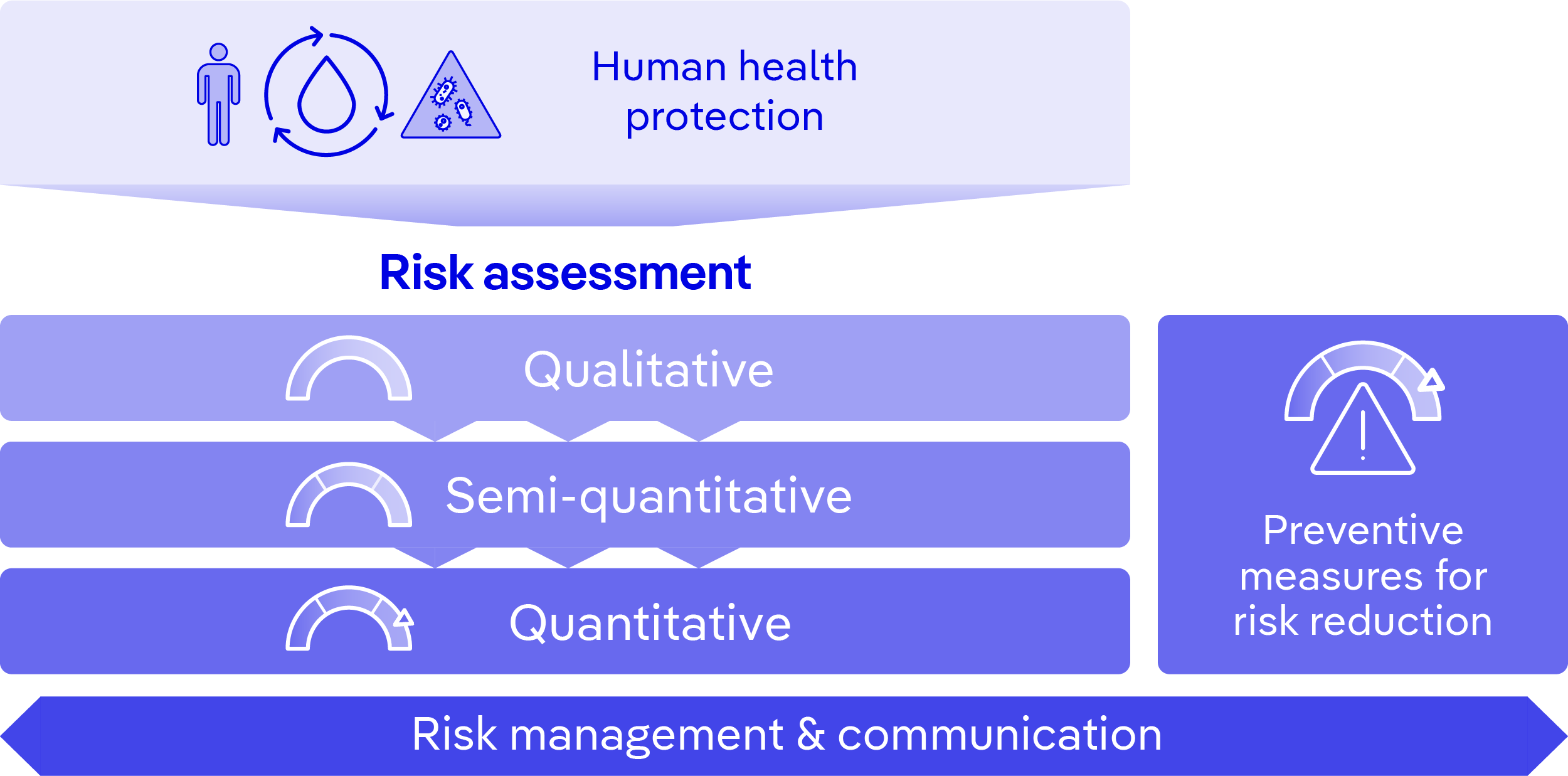Effective management of microbial safety is critical in maintaining water quality, particularly as international guidelines increasingly emphasize risk-based approaches for drinking water, water reuse, and recreational waters. The recent EU regulation on agricultural water reuse (EU 2020/741) underscores the importance of robust risk management plans.
However, managing microbial risks is challenging due to the diverse range of microorganisms present in various water sources. This is where our Microbial Risk Assessment (MRA) services play a pivotal role. By integrating multidisciplinary expertise in process engineering, microbiology, risk modeling, and statistical simulation, we provide tailored solutions to support the development of comprehensive risk management plans.

In short, microbial risk assessment:
Provides actionable insights to improve system performance and safety.
Evaluates human health risks associated with the presence of microbial hazards based on pathogens and treatment performance.
Integrates system-wide information for a detailed understanding of water treatment or reuse processes.
We offer two levels of microbial risk assessment depending on complexity and scope:
1. Qualitative and Semi-Quantitative Microbial Risk Assessment
Identification and qualitative or semi-quantitative assessment of microbial risks for a specific context, application and/or a specific location
Summarizes risks using a risk matrix based on literature research and expert knowledge.
2. Quantitative Microbial Risk Assessment (QMRA)
Uses advanced statistical modeling and simulation to provide a quantitative estimate of risks, including uncertainty and sensitivity analysis.
Evaluates risks associated with specific pathogens, leveraging reference pathogens to represent worst-case scenarios (viruses, bacteria, protozoa).
Combines local data and literature research for probabilistic simulations and in-depth quantitative assessments.
Comprehensive Expertise: Our team combines knowledge in microbiology, process engineering, and statistical modeling to create scientifically robust assessments.
Tailored Solutions: We adapt our approaches to the unique needs of each customer.
Transparent and Explainable Approach: We prioritize clear communication, ensuring our approaches and models are easy to understand for all stakeholders.
Scalable and Adaptive: Our methods range from qualitative assessments to advanced quantitative methods, scaling as required.
Integration of Local Knowledge: We incorporate local information and expert insights to refine our models throughout the process.
Stakeholder Empowerment: We help clients communicate results effectively to local authorities, the general public, and decision-makers.
1. System Description and Visualization
Defining system boundaries, treatment processes, and the scope of the problem.
Visualizing systems using tools like Bayesian networks, allowing iterative refinement with new data.
2. Data Collection and Input Definition
Combining local and external information, including source water quality, expert knowledge, and literature data.
Identifying relevant model inputs to ensure accuracy and relevance.
3. Risk Assessment and Modeling
Conducting either qualitative assessments based on expert knowledge and literature research or quantitative assessments using statistical simulations.
Providing a detailed evaluation of risks, uncertainties, and sensitivities.
4. Reporting and Recommendations
Delivering comprehensive reports in collaboration with clients.
Offering recommendations for improving tier levels, collecting additional data, and updating risk assessments.
5. Supporting the Development of Risk Management Plans
Supporting the creation of robust risk management plans, including recommendations for risk reduction measures.
Facilitating stakeholder communication through clear, scientifically grounded language.
We leverage Bayesian approaches to model water treatment systems for risk assessment, refining them continuously with new data via Bayesian inference. This allows us to provide dynamic, data-driven insights that evolve alongside your system’s needs.
Microbial risk assessment is vital to understanding and managing the safety of water systems. By integrating all available information and leveraging cutting-edge modeling techniques, we empower water managers to make informed decisions, ensuring public health and system reliability.
Contact us today to discuss how our expertise can support your water safety goals. Together, we’ll build a safer, more sustainable future for water systems.


